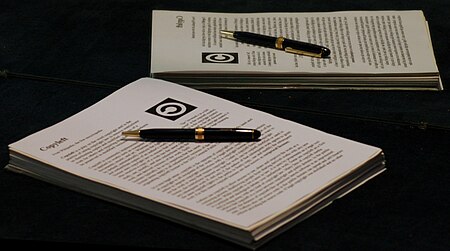FCW approved licenses
| Course dashboard for #OCL4Ed | ||
|---|---|---|
| The right license | Video signpost - Frances Ferreira | Introduction | The essential freedoms | Free cultural works | FCW approved licenses | Technology issues | E-Activity - 3rd Learning reflection | |
Contents
The problem
In many jurisdictions of the world, the default regulations pertaining to intellectual property rights are becoming more restrictive. Moreover, managing the copyright of collaborative projects over national boundaries in a digital environment is complex because property rights of creative works are typically regulated by national copyright legislation which were not designed for digital environments.In a digital OER world, many of these problems may be avoided by shifting from a default culture of restrictions to a proactive culture of giving permissions in advance. Creative Commons provides the legal framework to refine copyright by providing the necessary permissions to support the freedom to use and adapt educational materials in advance. This is an effective way to encourage and support educational freedom of choice.
Obtaining the 4R permissions (i.e., reuse, revise, remix, redistribute) in advance contributes to the sustainability of education. OER projects like the WikiEducator community do not incorporate all-rights reserved copyright material into the wiki. Every time a contributor makes an edit on WikiEducator, he/she confirms that the contribution is original work (to be shared under a free cultural works approved license) or is sourced from the public domain or similar free (libre) resources.
Free content licenses
In this tutorial, we do not have the scope to cover all free licenses. We will focus our attentions on the Creative Commons licenses.
The freedom "paradox"
There is a healthy debate in the Open Education Resource community regarding the implementation of the essential freedoms for OER.
The Creative Commons licenses are reasonably well known in the education community and there is a strong association with the use of this license and the sharing of content. However, only two of the six generic Creative Commons licenses meet the requirements of the free cultural works definition.
Creative Commons licenses are often associated with the strap-line: "Share, reuse and remix legally", which may convey the impression that all licenses permit unrestricted sharing and reuse - which is not the case.Some advocates of the libre community suggest that this statement misleads the general public because there are configurations of the Creative Commons license that don't meet the requirements of the free cultural works definition. However, Creative Commons international has made a very clear distinction between the license alternatives which are free and those which are "non-free".
The counter argument is one of freedom of choice, namely that individuals should have the freedom to choose among the different license alternatives, including those configurations that restrict the use of the resource in a way that the resource would not qualify as free content under the requirements of the free cultural works definition. Supporters of this view contend that the public is provided with unrestricted access to tools, information and tutorials on what each of the license alternatives mean. It is the resource owners' responsibility to use the materials to inform their decision as to which license to choose for their resource.
To avoid ambiguity, the two Creative Commons licenses which meet the requirements of the free cultural works definition are:
- Attribution (CC BY)
- Attribution share-alike (CC BY-SA)
A Creative Commons license which contains either or both of the following restrictions does not meet the requirements of the free cultural works definition:
- No derivative works (ND)
- Non commercial (NC)
The right to earn a living?
A topical debate in the OER arena relates to the question of the non-commercial (NC) restriction. The free cultural works definition does not permit the inclusion of the non-commercial restriction.
Many supporters of the free culture cite the principles of free speech (Article 19) and the rights to just and favourable remuneration (Article 23) of the United Nations Universal Declaration of Human Rights as a reason not to exclude the rights to earn a living from OER. Other free learning proponents argue that the phenomena of conversion and enclosure warrant the inclusion of the non-commercial restriction (see for example Downes 2011[1]). Conversion refers to the appropriation of free and open content and resources by commercial providers for commercial gain, while enclosure refers to the practice of using technological and other means to restrict access to the original no-cost alternative.
The OER Foundation holds the view that the share-alike provision combined with the requirement to store digital artifacts using open and free file formats is sufficient to legally protect OER from risks of commercial exploitation without compromising the rights of individuals to earn a living.
| The Case for Free Use: Reasons Not to Use a Creative Commons -NC License
Erik Möller has authored a seminal essay explaining why free content projects should not use the Non-Commercial (NC) restriction. Erik is Deputy Director of the Wikimedia Foundation and co-author of the Free Cultural Works Definition.
|
Video reflection
|
Creative Commons means the story doesn't need to end
Chris Betcher is an educator based in Australia and former #OCL4Ed participant. He is an advocate of Creative Commons licensing in education and decided to remove the Non-Commercial (NC) restriction from his blog. In the previous unit, Justin Cone posed the question in his video reflection: "Is the project bigger than me?" and suggested that Creative Commons licensing is the enabler for the story to continue. The story does continue, and in this video Chris Betcher reflects on:
Feel free to share you thoughts on Chris' reflection on WEnotes, twitter or Google+ and remember to include the hash tag "#OCL4Ed" in your post. |
Debating whether OER should permit commercial use
| To NC or not to NC in education
The purpose of this discussion forum is to interrogate the issues associated with the Non-Commercial (NC) restriction. Choose your personal position on the debate: OER should permit and encourage commercial activity for a sustainable ecosystem. Post your arguments and/or rebuttals in the discussion forum on Google+.
Optional reading For more detailed discussion on this topic, visit the Oxford style debate hosted by UNESCO on whether OER should favour commercial use (see content on the site under each of the tabs below the intro, or use the following links to access a specific phase of the debate):
|
Links
- The Definition of Free Cultural Works provides a useful grid comparing different licenses for further reference.
- Creative Commons
- Reasons why not to use the NC restriction
References
- ↑ Downes, S. 2011. The OER Debate, In Full. Retrieved 29 December 2011

